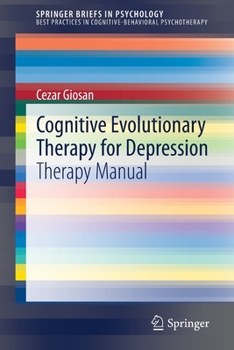Cognitive Evolutionary Therapy for Depression: Therapy Manual
Evolutionary psychology has recently made inroads in clinical psychology, bringing the understanding that, in some cases, mental symptoms are not manifestations of brain disorders, but rather evolved mechanisms that might function in overdrive or signal fitness problems. Thus, improvements in fitness may lead to improvements in those symptoms. Armed with such insights, this brief describes a comprehensive therapy protocol for depression - Cognitive Evolutionary Therapy (CET) -, which incorporates evolutionary understandings of this condition into well-validated cognitive techniques. CET starts with an evaluation of the evolutionary fitness of an individual, which represents the springboard for specific, evolutionary-driven behavioral and cognitive interventions. Based on the fitness evaluation, which takes place at intake, the CET therapist comes pre-equipped with a list of the patient's fitness problems and can start working on them very early on in therapy, potentially leading toshorter interventions and cost savings. This brief will appeal to clinical psychologists and therapists who frequently employ CBT principles in therapy, as well as to clinicians who want to incorporate insights from evolutionary disciplines into their approaches.
Related Subjects
Psychology




